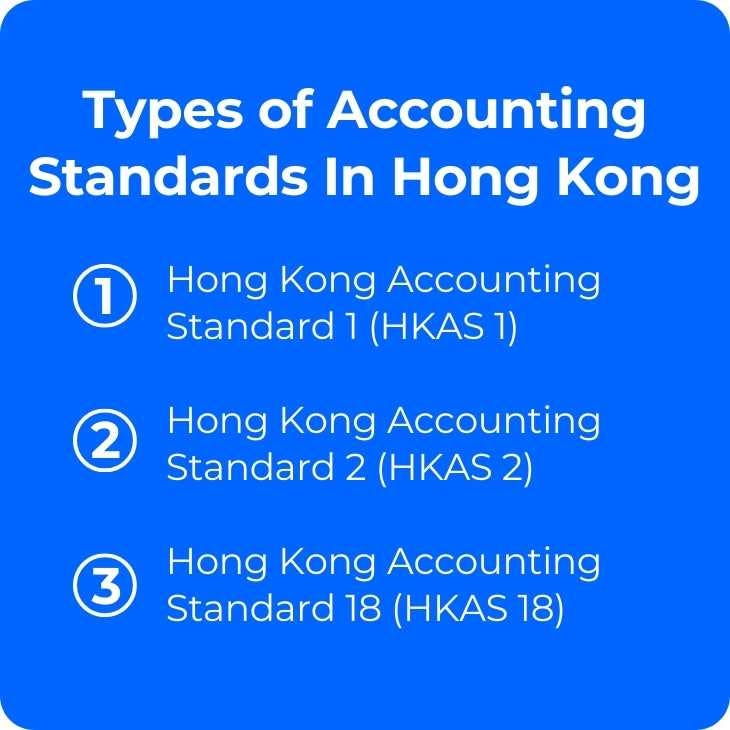Hong Kong accounting standards are a set of guidelines and regulations that govern how businesses operate in Hong Kong. These standards are designed to ensure that the financial information reported by companies is consistent, accurate, and transparent.
All companies in Hong Kong must comply with these standards, maintain proper accounts, and meet audit requirements.
Hong Kong has converged its standards with the International Financial Reporting Standards (IFRS), creating the HKFRS.
A specific standard applies to small and medium-sized entities, the Hong Kong Small and Medium-sized Entity Financial Reporting Framework and Financial Reporting Standard (SME-FRF & SME-FRS).
Hong Kong accounting standards are a set of rules that regulate all financial transactions in Hong Kong and outline important accounting terms and standards.
All companies incorporated in Hong Kong are to abide by these provisions, maintain proper accounts, and meet statutory audit requirements.
These accounting standards are governed by the Financial Reporting Standards (FRS), which is based on the International Financial Reporting model (IFRS) established by the International Accounting Standards Board (IASB).
These standards were introduced to highlight the fundamental principles that define Hong Kong accounting terms and clarify their scope to ensure fairness and honesty in a company's financial statements.
Hong Kong companies are required to keep a record of all their transactions and have their accounts audited by a Certified Public Accountant (CPA) each financial year. A financial year normally consists of a 12-month period. Note, however, that the first financial of a newly registered company may last for up to 18 months.
What Are Hong Kong's Accounting Standards?
There are 41 accounting standards and 15 financial reporting standards set out by the HKFRS, along with other statutory interpretations.
Each standard represents a particular topic, such as financial statements, cash flow statements, inventory, and taxes, to name a few.
An overview of three important Hong Kong Accounting Standards (HKAS) is provided below.
How Is Accountancy Regulated In Hong Kong?
The Hong Kong Institute of Certified Public Accountants (HKICPA) is the professional body responsible for regulating accountancy in Hong Kong and issued the updated HKFRS in January 2005.
All companies in Hong Kong are required to prepare financial statements.
Financial statements are records that show the financial performance and business activities of a company or business entity.
Financial statements based on accrual accounting summarize all past transactions and any future cash payment obligations and highlight where cash might accrue in the future.
These statements notably include a balance sheet or a statement of financial position, a statement of comprehensive income/a profit and loss account, a statement of change in equity or financial capital, and the auditor's report, along with additional explanatory notes and accounting policies.
Types of Accounting Standards In Hong Kong

Hong Kong Accounting Standard 1 (HKAS 1) – Presentation of Financial Statements
HKAS 1 outlines the requirements regarding preparing and presenting financial statements by a business entity in terms of its structure and content.
- Management is required to assess the entity's ability to continue as a going concern unless it intends to stop trading and liquidate the entity.
- Financial statements excluding cash flow information are required using the accrual basis of accounting.
- Preparing financial statements is required at least once a year.
Hong Kong Accounting Standard 2 (HKAS 2) – Inventories
HKAS 2 outlines the provisions regarding the accounting standards for inventories in terms of the amount of cost that is to be recognized as an asset and how they are to be carried forward.
- Inventories are to be calculated and measured at the lower cost of and net realizable value.
- The cost of inventories must include the cost of purchases, the cost of conversions, and any other costs incurred that contribute to the inventory's present location and condition
Hong Kong Accounting Standard 18 (HKAS 18) – Revenue
HKAS 18 outlines the accounting standards of revenue earned from particular types of business transactions and requirements regarding when revenue is to be recognized.
Learn more about HKICPA's financial reporting standards.
Specific Accounting Standard for SMEs?
A specialized reporting framework designed for small and medium-sized businesses (SMEs) has been introduced by the HKICPA. This framework consists of the Financial Reporting Standard (SME-FRS) and the SME Financial Reporting Framework (SME-FRF). The purpose of these standards is to make financial reporting easier for SMEs.
| Category | Small Guarantee Company/Group | Small Private Company/Group | Larger ("Eligible") Private Company/Group |
|---|---|---|---|
| Annual Revenue | < HKD 25 million | < HKD 100 million | < HKD 200 million |
| Total Assets | No limit | < HKD 100 million | < HKD 200 million |
| Average Employees | No limit | < HKD 100 million | < HKD 100 million |
Companies that are incorporated in Hong Kong must adhere to the size-based categorization and have the approval of at least 75% of shareholders in order to be qualified for reporting under both SME-FRF and SME-FRS.
The purpose of SME-FRF and SME-FRS is to make the reporting obligations of small and mid-size companies lighter:
| Purpose of SME-FRF and SME-FRS | Details |
|---|---|
| Simplified Reporting | HKFRS for SMEs simplifies financial reporting with fewer disclosures and easier measurement criteria, making it easier for SMEs to prepare statements. |
| Cost-Effective Compliance | Reducing the reporting burden helps SMEs save on accounting and auditing costs, allowing them to meet regulatory standards with fewer resources. |
| Relevance to Private Entities | The standards are designed for private entities without public accountability, making them more suited to SMEs' typical operations and reporting needs. |
| Flexibility in Financial Reporting | Instead of using full HKFRS, eligible SMEs can use HKFRS for SMEs, choosing a framework that fits their needs and size without requiring complicated accounting or significant disclosures. |
| Encouragement of Transparency | By promoting transparency and accountability, HKFRS for SMEs helps maintain Hong Kong as a reliable location for company records. |
| Alignment with International Standards | HKFRS for SMEs aligns with international practices, benefiting SMEs in global markets and attracting foreign investment. |
Find out more on the complete guide to accounting standards for SME-FRS in Hong Kong.
Are you looking for help with your accounting?
Register your business with Air Corporate, and we'll get you set up with the best accounting services, with all your documents available online at any time.
Focus on your business. We take care of the rest.
FAQs
The difference between Hong Kong Financial Reporting Standards (HKFRS) and International Financial Reporting Standards (IFRS) is minimal.
HKFRS aligns closely with IFRS but may include occasional amendments or interpretations specific to Hong Kong's regulatory framework and business practices.
Both aim to ensure consistency and comparability in financial reporting, with HKFRS tailored to address local requirements while maintaining alignment with IFRS principles.
Hong Kong Generally Accepted Accounting Principles (HK GAAP) used to be the accounting principles of reference in Hong Kong . Their usage has significantly decreased since the adoption of the Hong Kong Financial Reporting Standards (HKFRS), which align closely with International Financial Reporting Standards (IFRS).
A Hong Kong-based company must carefully document all of its financial transactions, including sales, purchases, expenses, director and employee salary, and profits. Maintaining these records in an organized fashion is required to comply with this legal responsibility, and doing so can have a big impact on a company's success or failure. Further, the Financial Statement is produced from these accounting records.
A company’s accounting records combine to create its Financial Statement, which provides insights into the company’s financial position over a specific period. This report includes the Balance Sheet, Income Statement, and Cash Flow Statement, detailing assets, liabilities, profits, expenses, and cash movements. For new business owners, understanding basic accounting principles from the start can help maintain accurate records as the business grows.




